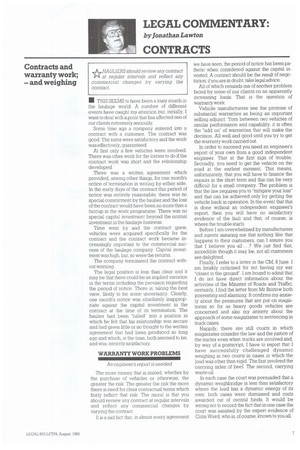LEGAL COMMENTARY:
Page 99

If you've noticed an error in this article please click here to report it so we can fix it.
by Jonathan Lawton
CONTRACTS
• THIS SEEMS to have been a busy month in the haulage world. A number of different events have caught my attention but, initially, I want to deal with a point that has affected one of our clients extremely seriously.
Some time ago a company entered into a contract with a customer. The contract was good. The rates were satisfactory and the work was effectively, guaranteed.
At first only a few vehicles were involved. There was other work for the lorries to do if the contract work was short and the relationship developed.
There was a written agreement which provided, among other things, for one month's notice of termination in writing by either side. In the early days of the contract this period of notice was entirely reasonable: there was no special commitment by the haulier and the loss of the contract would have been no more than a hiccup in the work programme. There was no special capital investment beyond the normal investment in the haulage business.
Time went by and the contract grew; vehicles were acquired specifically for the contract and the contract work became increasingly important to the commercial success of the haulage company. Capital investment was high, but, so were the returns.
The company terminated the contract without warning.
The legal position is less than clear and it may be that there could be an implied variation in the terms including the provision regarding the period of notice. There is, taking the best view, likely to be some uncertainty. Clearly, one month's notice was absolutely inappropriate against the capital investment in the contract at the time of its termination. The haulier had been "lulled" into a position in which he felt that his relationship was secure and had given little or no thought to the written agreement that had been produced so long ago and which, at the time, both seemed to be, and was, entirely satisfactory.
WARRANTY WORK PROBLEMS An engineer's report is needed
The more money that is staked, whether by the purchase of vehicles or otherwise, the greater the risk. The greater the risk the more there is need for clear contractual terms which fairly reflect that risk. The moral is that you should review any contract at regular intervals and reflect any commercial changes by varying the contract.
It is a sad fact that, in almost every agreement we have seen, the period of notice has been pathetic when considered against the capital invested. A contract should be the result of negotiation; if you are in doubt, take legal advice.
All of which reminds me of another problem faced by some of our clients on an apparently increasing basis. That is the question of warranty work.
Vehicle manufacturers see the promise of substantial warranties as being an important selling adjunct. Torn between two vehicles of similar performance and capability, it is often the "add on" of warranties that will make the decision. All well and good until you try to get the warranty work carried out.
In order to succeed you need an engineer's report of your own from a good independent engineer. That at the first sign of trouble. Secondly, you need to get the vehicle on the road at the earliest moment. This means, unfortunately, that you will have to finance the repairs in the short term and this can be very difficult for a small company. The problem is that the law requires you to "mitigate your loss" and that can be achieved only by getting the vehicle back in operation. In the event that this is done without an independent engineers report, then you will have no satisfactory evidence of the fault and that, of course, is where the trouble starts.
Before I am overwhelmed by manufacturers and agents assuring me that nothing like that happens to their customers, can I assure you that I believe you all . . .? We just find that, incredible though it may be, not all customers are delighted.
Finally, I refer to a letter in the CM, 8 June. I am briskly criticised for not having my ear "closer to the ground". I am bound to admit that I do not have direct information about the activities of the Minister of Roads and Traffic; certainly, I find the letter from Mr Bristow both interesting and alarming. It confirms my anxiety about the pressures that are put on magistrates so far as heavy goods vehicles are concerned and also my anxiety about the approach of some magistrates to sentencing in truck cases.
Happily, there are still courts in which magistrates consider the law and the justice of the matter even when trucks are involved and, by way of a postscript, I have to report that I have successfully challenged dynamic weighing in two courts in cases in which the load was other than rigid. The first involved the carrying sides of beef. The second, carrying waste oil.
In each case the court was persuaded that a dynamic weighbridge is less than satisfactory where the load has a dynamic energy of its own: both cases were dismissed and costs awarded out of central funds. It would be wrong not to record the fact that in one case the court was assisted by the expert evidence of Colin Ward, who is, of course, known to you all.




































































































